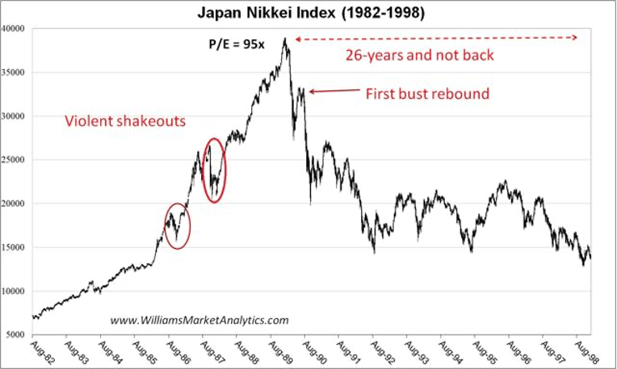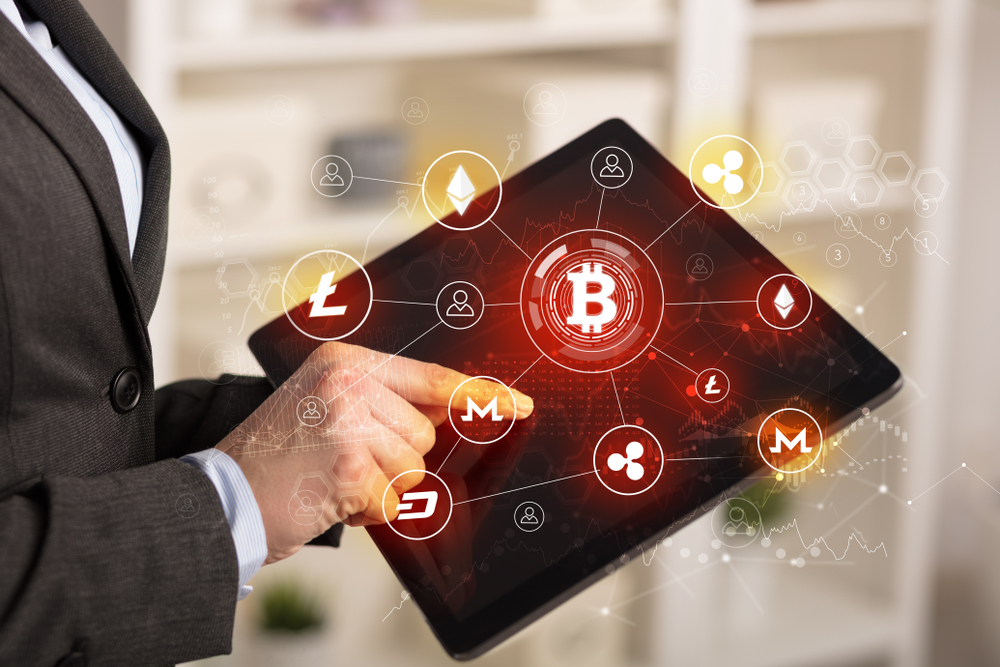So what did we learn from the recent Cryptocurrency market bubble?
Nothing – in short.
Nothing we did not already know...
The first thing to understand is that cryptocurrency is not the first bubble market and won’t be the last.
History repeats itself. As long as there are market participants engaging in the free trade of an asset – financial bubbles will inevitably ensue – some fortunes made with many more lost
A brief history of some notable financial bubbles is below…
- Tulipmania 1636-37[1]
- South Sea Bubble 1700s[2]
- Railwaymania 1840s[3]
- Japanese Asset Price Bubble (1986-1991)*
Japan’s bubble was characterized by a rapid acceleration of real estate prices (and subsequently stock prices) and an overheated economy. All of this was fuelled by a Bank of Japan monetary policy error, lowering interest rates and allowing uncontrolled money supply and credit expansion. The euphoria phase was characterized by Japanese citizens, traditionally great deposit savers, shifting money from savings accounts into the capital market.[4]

*Eerie similarities between the Japanese Asset Price bubble and the current US and Australian Economy – I will examine this more closely in my next article on Modern Monetary Theory
- Dot-Com Bubble 1995-2001
- Cryptocurrency Bubble 2018 & 2021
Here are the 5 stages of financial bubbles every investor should familiarise themselves whether they knowingly or unknowingly decide to participate in the next one:
Stage 1. Displacement
An event or innovation occurs that sharply changes expectations. This phase is typically grounded in reality and good intentions.
The idea for distributed digital scarcity-based cryptocurrency was genesised in the 1990s by Chinese computer engineer Wei Dei. This idea was refined and some say mastered on 18 august 2008 by Satoshi Nakamoto with the mining of this bitcoin block.
The genesis block of bitcoin ledger read: The Times Jan/03/2009 Chancellor on brink of second bailout for banks
The time-stamped quotation of the Times headline and an ode to the quintessence of bitcoin – a decentralised alternative to the current central banking system.
A well-intended sentiment which in time would only grow in popularity over the next decade.
Stage 2. Boom
Prices rise slowly at first, following a displacement, but then gain momentum as more and more participants enter the market, setting the stage for the boom phase. During this phase, the asset in question attracts widespread media coverage. Fear of missing out on what could be a once-in-a-lifetime opportunity spurs more speculation, drawing an increasing number of investors and traders into the fold.
Stage 3. Euphoria
Valuations reach extreme levels during this phase as new valuation measures and metrics are touted to justify the relentless rise, and the "greater fool" theory—the idea that no matter how prices go, there will always be a market of buyers willing to pay more—plays out everywhere.
Common for investors to disregard investment strategies and submit to the hype where high valuations are perceived as asset success which is a misnomer.
Many crypto investors telling themselves in 2021 “this time it’s different”…
Stage 4. Profit-Taking
The smart money begins heeding the warning signs and is selling positions to take profits.
Stage 5. Panic
Reality sets in, investors panic, and prices reverse course and descend faster than they increased.
Why do bubbles happen…
I could take this opportunity to dump an excessive amount of academic research as to why financial bubbles occur- referring to the different types of behavioural and cognitive biases which drive them.
However, I would much rather impart a concise explanation of market bubbles from Warren Buffet followed by some practical steps on how an everyday investor can survive the next one…
"People start being interested in something because it's going up, not because they understand it or anything else. But the guy next door, who they know is dumber than they are, is getting rich and they aren't," he said. "And their spouse is saying can't you figure it out too? It is so contagious. So that's a permanent part of the system."[5] -Warren Buffett October 1, 2008…
Key Lessons to Learn from the Crypto Bubble:
- Risk-weighted Asset Allocation
The foundation to successful investments is diversification – not just across asset classes but across risk profiles also.
Conservative investments such as property, bonds, Bluechip stocks, should always make the majority of anyone’s portfolio.
Even our managed investments – like our Swing Strategy – which is although high-performing, should only be a 10% allocation of the client’s portfolio due to its assertiveness.
Even I could not ignore the potential for high return in the cryptocurrencies earlier this year – and when many of my clients discussed it as a potential investment I simply told them ‘no more than 1% allocation of your portfolio or only as much as you’re a prepared to lose’.
- Avoid Getting-even-itis!
Loss aversions are the tendency of investors to NOT cut losses short, and instead, hold on to losing investments until they can be sold at the break-even price paid for it. This happens because realizing a loss is painful, while it’s easy to feel good about selling something a gain. [6]
An observed continuation of loss aversions is the tendency to increase in an attempt to get even with the market.
There is a temptation for investors who were scorned by the recent crypto crash to chase their losses and take start making wild speculative investments in an attempt to recover their lost monies.
It is vital the investor avoid getting-even-it is making an immediate transition or return to more sustainable investing.
To find out more about Walker Capital’s Managed Investment please schedule a time with one of our staff.
[1] https://www.history.com/news/tulip-mania-financial-crash-holland
[2] https://www.historic-uk.com/HistoryUK/HistoryofEngland/South-Sea-Bubble/
[3] https://www.focus-economics.com/blog/railway-mania-the-largest-speculative-bubble-you-never-heard-of
[4] https://www.investopedia.com/articles/personal-finance/062315/five-largest-asset-bubbles-history.asp
[5] https://www.cnbc.com/id/26982338
[6] https://www.nngroup.com/articles/prospect-theory/
.png?width=230&name=logo%20(3).png)




